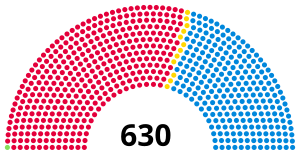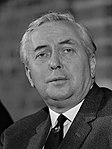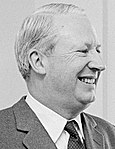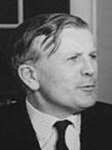The 1966 United Kingdom general election was held on Thursday 31 March 1966. The result was a landslide victory for the Labour Party led by incumbent Prime Minister Harold Wilson.
| |||||||||||||||||||||||||||||||||||||||||||||||||
All 630 seats in the House of Commons 316 seats needed for a majority | |||||||||||||||||||||||||||||||||||||||||||||||||
|---|---|---|---|---|---|---|---|---|---|---|---|---|---|---|---|---|---|---|---|---|---|---|---|---|---|---|---|---|---|---|---|---|---|---|---|---|---|---|---|---|---|---|---|---|---|---|---|---|---|
| Opinion polls | |||||||||||||||||||||||||||||||||||||||||||||||||
| Turnout | 75.8%, | ||||||||||||||||||||||||||||||||||||||||||||||||
| |||||||||||||||||||||||||||||||||||||||||||||||||
 Colours denote the winning party—as shown in § Results | |||||||||||||||||||||||||||||||||||||||||||||||||
 Composition of the House of Commons after the election | |||||||||||||||||||||||||||||||||||||||||||||||||
| |||||||||||||||||||||||||||||||||||||||||||||||||
Wilson decided to call a snap election since his government, elected a mere 17 months previously, in 1964, had an unworkably small majority of only four MPs. The Labour government was returned following this snap election with a much larger majority of 98 seats. This was the last British general election in which the voting age was 21; Wilson's government passed an amendment to the Representation of the People Act in 1969 to include eligibility to vote at age 18, which was in place for the next general election in 1970.
This was the only election between 1945 and 1997 in which the Labour Party won a workable majority sustainable to last a full term. In the next seven general elections, the Labour Party would win a majority of seats only once (October 1974) and would lose five elections to the Conservatives. This election also noted the Labour Party achieving its third-highest vote-share (48%) and second largest total number of votes in history (the largest vote-share being the 49.7% achieved in the 1945 election).
Background
editPrior to the 1966 general election, Labour had performed poorly in local elections in 1965, and lost a by-election, cutting their majority to just two. Shortly after the local elections, the leader of the Conservative Party Alec Douglas-Home was replaced by Edward Heath in the 1965 leadership election.
Despite setbacks and a small majority, Labour believed it had an advantage due to the disorientation from the change of leadership at the Conservative Party, the improvement of economic conditions under its brief government, and a victory at the 1966 Kingston upon Hull North by-election.[1] The Conservatives had not had much time to prepare their campaign, although it was more professional than previously. There had been little time for Heath to become well known among the British public, having led the party for just eight months before the election. For the Liberal Party, money was an issue: two elections in the space of just two years had left the party in a tight financial position and had to field fewer candidates.[2] Labour ran its campaign with the slogan "You know Labour government works" and avoided commenting on controversial issues such as European integration, trade unions, and nationalisation.[1]
The election night was broadcast live on the BBC, was presented by Cliff Michelmore, Ian Trethowan, Robin Day, Robert McKenzie and David Butler. The election was replayed on the BBC Parliament channel on the 40th anniversary of the event,[3] and again in 2016 to mark the 50th anniversary of the election.[4]
Although the BBC's telecast was in black and white, a couple of colour television cameras were placed in the BBC election studio at Television Centre to allow CBS's Charles Collingwood and NBC's David Brinkley to file live reports from that studio by satellite and in colour for their respective networks' evening news programmes (which were transmitted at 11:30 pm British time, 6:30 pm Eastern Standard Time).
Timeline
editThe Prime Minister, Harold Wilson, announced on 28 February that Parliament would be dissolved on 10 March, for an election to be held on 31 March. The key dates were as follows:
| Thursday 10 March | Dissolution of the 43rd Parliament and campaigning officially begins |
| Monday 21 March | Last day to file nomination papers; 1,707 candidates enter to contest 630 seats |
| Wednesday 30 March | Campaigning officially ends |
| Thursday 31 March | Polling day |
| Friday 1 April | The Labour Party wins with an improved majority of 98 |
| Monday 18 April | 44th Parliament assembles |
| Thursday 21 April | State Opening of Parliament |
Opinion polling
edit- Research Services: 3% swing to Labour (forecast majority of 101)
- National opinion polls: 3.5% swing to Labour (forecast majority of 115)
- Gallup: 4.5% swing to Labour (forecast majority of 150)
- Express (known as Harris): 7.5% swing to Labour (forecast majority of in excess of 255)
Results
editThe Labour Party performed very well in the election and expanded its previously slim majority against the Conservative opposition to 97 seats, accomplishing a net gain of 48 seats. It won 364 seats from 48 per cent of the vote, against 253 seats from 41.4 per cent for the Conservatives and 12 seats from 8 per cent for the Liberals. A major reason for the Labour victory was the revitalization of the party's working-class support in the 1960s. It captured its highest support yet from manual laborers at 69 per cent, as well as its best performance for non-manual laborers since 1945. The government also appealed to both the right wing of the party with its cabinet dominated by junior ministers of the Attlee ministry as well as the left wing by the presence of officials such as Prime Minister Wilson, Richard Crossman, Barbara Castle, and Frank Cousins.[1] Although the party would go on to win more seats under Tony Blair in 1997 and 2001, Labour have never since matched the 48% of the popular vote they won in 1966.

| Candidates | Votes | ||||||||||
|---|---|---|---|---|---|---|---|---|---|---|---|
| Party | Leader | Stood | Elected | Gained | Unseated | Net | % of total | % | No. | Net % | |
| Labour | Harold Wilson | 622 | 364[note 1] | 48 | 1 | +47 | 57.8 | 48.0 | 13,096,629 | +3.9 | |
| Conservative | Edward Heath | 629 | 253 | 0 | 51 | −51 | 40.2 | 41.9 | 11,418,455 | −1.5 | |
| Liberal | Jo Grimond | 311 | 12 | 5 | 2 | +3 | 1.9 | 8.5 | 2,327,457 | −2.7 | |
| SNP | Arthur Donaldson | 23 | 0 | 0 | 0 | 0 | 0.5 | 128,474 | +0.3 | ||
| Ind. Republican | N/A | 5 | 0 | 0 | 0 | 0 | 0.2 | 62,782 | N/A | ||
| Communist | John Gollan | 57 | 0 | 0 | 0 | 0 | 0.2 | 62,092 | 0.0 | ||
| Plaid Cymru | Gwynfor Evans | 20 | 0 | 0 | 0 | 0 | 0.2 | 61,071 | −0.1 | ||
| Independent | N/A | 15 | 0 | 0 | 0 | 0 | 0.1 | 35,039 | N/A | ||
| Republican Labour | Gerry Fitt | 1 | 1 | 1 | 0 | +1 | 0.2 | 0.1 | 26,292 | 0.0 | |
| Nationalist | Eddie McAteer | 1 | 0 | 0 | 0 | 0 | 0.1 | 22,167 | N/A | ||
| Independent Liberal | N/A | 3 | 0 | 0 | 0 | 0 | 0.0 | 5,689 | N/A | ||
| British National | John Bean | 3 | 0 | 0 | 0 | 0 | 0.0 | 5,182 | 0.0 | ||
| Ind. Conservative | N/A | 4 | 0 | 0 | 0 | 0 | 0.0 | 4,089 | N/A | ||
| Union Movement | Oswald Mosley | 4 | 0 | 0 | 0 | 0 | 0.0 | 4,075 | N/A | ||
| Independent Labour | N/A | 1 | 0 | 0 | 0 | 0 | 0.0 | 1,031 | N/A | ||
| Fellowship | Ronald Mallone | 1 | 0 | 0 | 0 | 0 | 0.0 | 906 | 0.0 | ||
| National Democratic | David Brown | 1 | 0 | 0 | 0 | 0 | 0.0 | 769 | N/A | ||
| National Teenage | Screaming Lord Sutch | 1 | 0 | 0 | 0 | 0 | 0.0 | 585 | N/A | ||
| Ind. Labour Party | Emrys Thomas | 1 | 0 | 0 | 0 | 0 | 0.0 | 441 | 0.0 | ||
| Socialist (GB) | N/A | 2 | 0 | 0 | 0 | 0 | 0.0 | 333 | 0.0 | ||
| Radical Alliance | Pat Arrowsmith | 1 | 0 | 0 | 0 | 0 | 0.0 | 163 | N/A | ||
| Patriotic Party | Richard Hilton | 1 | 0 | 0 | 0 | 0 | 0.0 | 126 | 0.0 | ||
| Government's new majority | 98 |
| Total votes cast | 27,264,747 |
| Turnout | 75.8% |
Votes summary
editSeats summary
editIncumbents defeated
editTelevised declarations
editThese declarations were covered live by the BBC where the returning officer was heard to say "duly elected".
- The 5,117 votes polled for the "Others" in Nelson and Colne were all polled for Patrick Downey, uncle of Lesley Ann Downey, who had been murdered by the Moors Murderers. Downey advocated the return of hanging.
See also
editNotes
edit- ^ a b The seat and vote count figures for Labour given here include the Speaker of the House of Commons
- ^ The Conservative figure includes Ulster Unionists and National Liberals.
References
edit- ^ a b c Thorpe, Andrew (1997). A History of the British Labour Party. London: Macmillan Education UK. p. 157. doi:10.1007/978-1-349-25305-0. ISBN 978-0-333-56081-5.
- ^ "1966: Wilson gains mandate", BBC News, 5 April 2005, retrieved 26 May 2018
- ^ "Election replay 1966", BBC News, 29 March 2006, retrieved 26 May 2018
- ^ 1966 General Election, BBC Parliament, retrieved 26 May 2018
Further reading
edit- Butler, David E.; et al. (1966), The British General Election of 1966, the standard scholarly study.
- Craig, F. W. S. (1989), British Electoral Facts: 1832–1987, Dartmouth: Gower, ISBN 0900178302
External links
edit- United Kingdom election results—summary results 1885–1979 Archived 23 February 2008 at the Wayback Machine
Manifestos
edit- Action Not Words: The New Conservative Programme, 1966 Conservative Party manifesto
- Time for Decision, 1966 Labour Party manifesto
- For All the People: the Liberal Plan of 1966, 1966 Liberal Party manifesto


